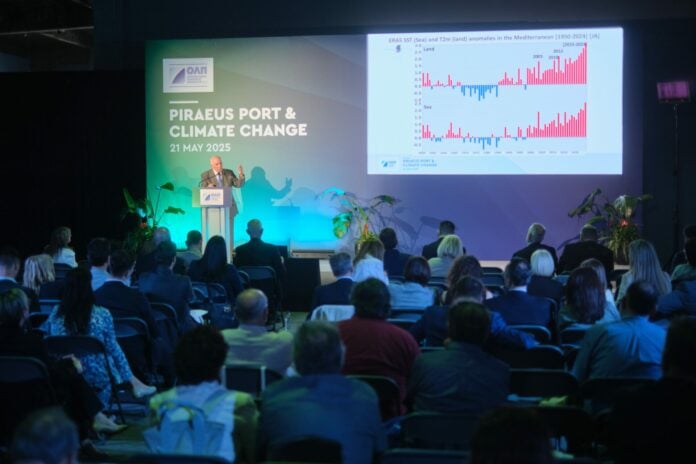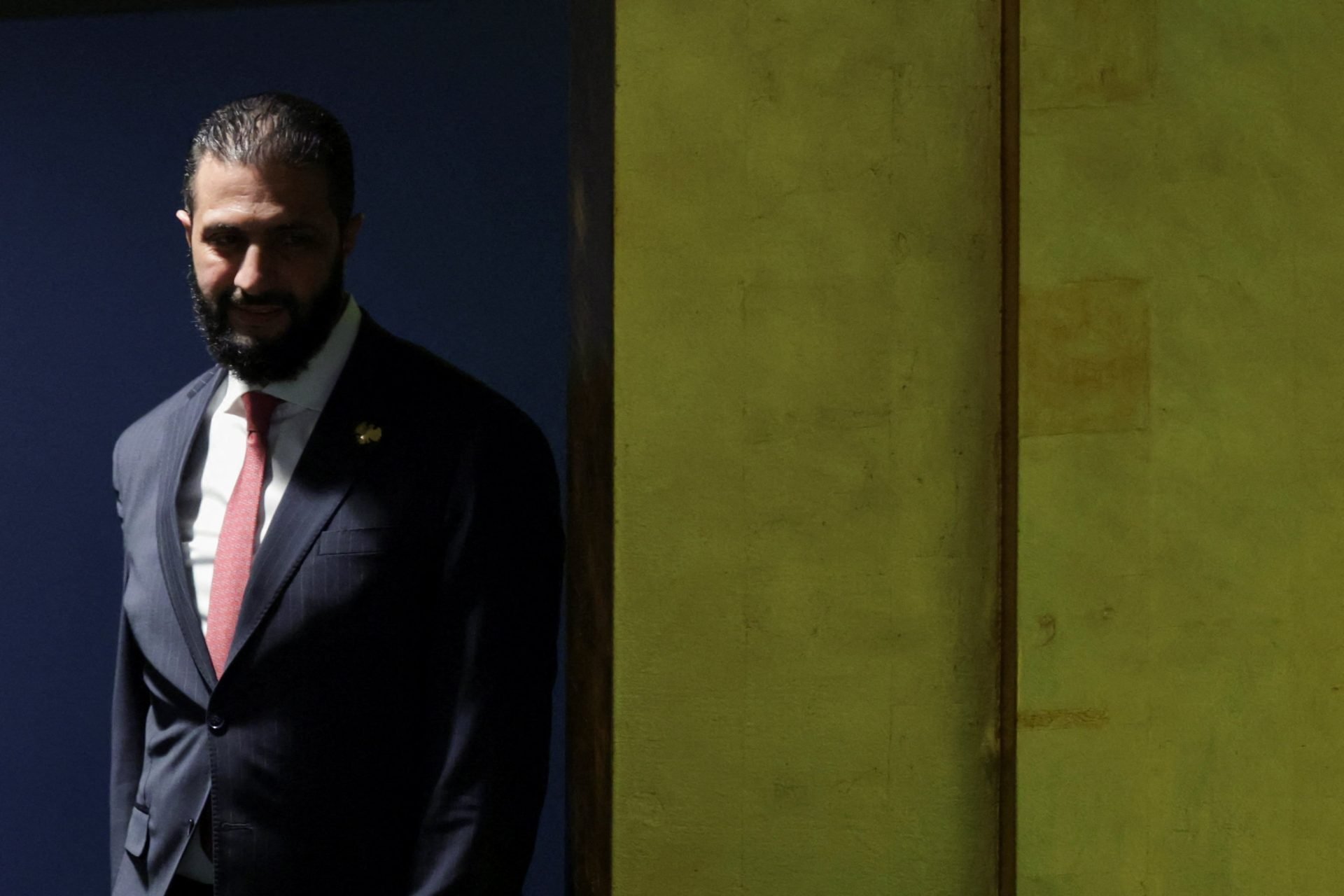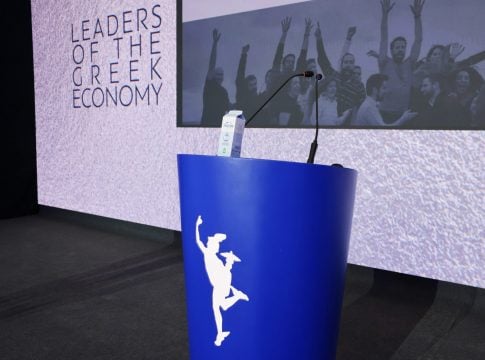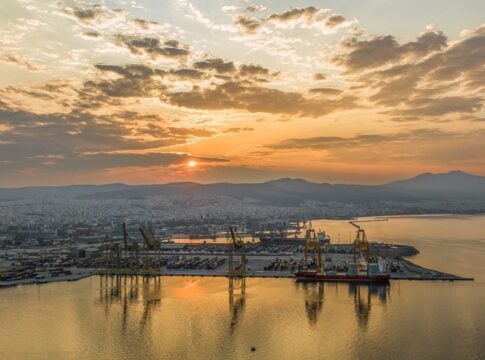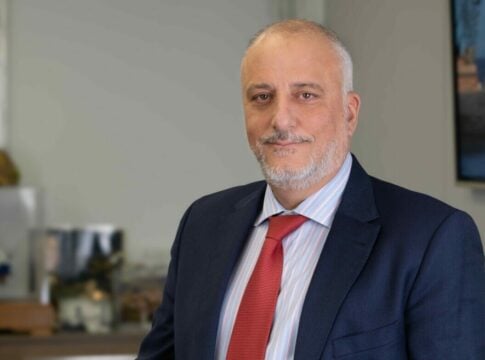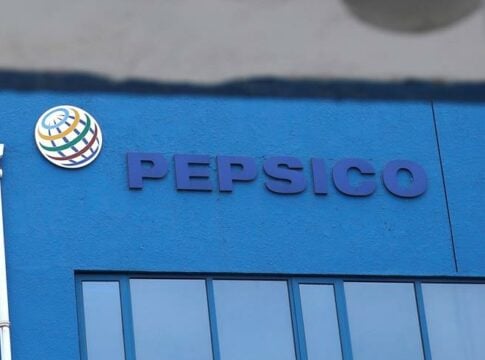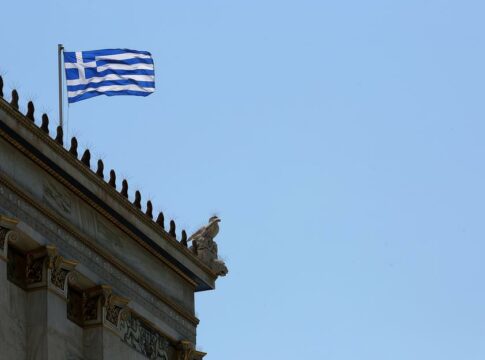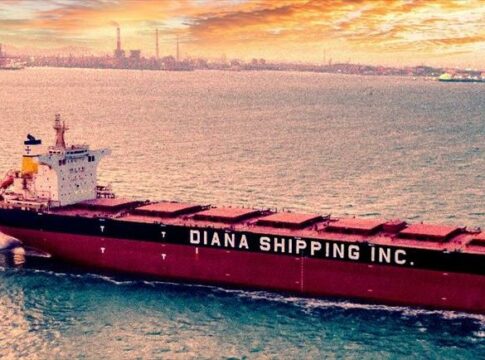The port of Piraeus is on track for addressing the challenges of climate change.
A comprehensive study, aimed at strengthening the resilience of the port infrastructure of Piraeus and ensuring their sustainable operation in the coming years, was prepared by the Piraeus Port Authority (PPA) S.A., in collaboration with the Academy of Athens and the consulting firm Adens S.A. with the participation of leading academic and environmental organizations.
“Collaboration between public, private and academic bodies is the key to effective and lasting change,” stressed Professor Christos Zerefos, Secretary General of the Academy of Athens, presenting the relevant study in the stone warehouse of the PPA.
Warning signal
Professor Christos Zerefos sounded the “warning signal” for the galloping rate of increase in global temperature and carbon dioxide concentrations.
According to Zerefos, if immediate measures are not taken using alternative forms of energy, global temperatures could increase by up to 4-5 degrees Celsius compared to the average values of the last 50 years, with disastrous consequences for countries like Greece, which are already facing water shortage problems.
The professor stressed the need to meet the commitments of the Paris Agreement, aiming to reduce dependence on fossil fuels by 80% and replace them with renewable energy sources.
He also added that, according to a recent study for the European Commission, the EU can become 80% energy independent, thanks to the sufficiency of renewable sources.
For example, France ranks first in the use of renewable energy sources, with Greece following in second place.
In a critical position
Zerefos also said that the port of Piraeus is located in a particularly sensitive geographical location, where the sea breeze acts both as a cooling factor and as a conduit for pollutants, transferring emissions from ships to the urban environment.
Adaptation measures
Stella Kaimaki, environmental civil engineer at Adens S.E., referred to the vulnerability and sensitivity of the system to the effects of climate change.
She outlined the measures that the port of Piraeus should emphasize and prioritize, such as maintaining and maximizing operational resilience and adaptive capacity, while adding that major infrastructures that are used in real time should be replaced, when we are talking about a rise in sea level or maximum temperature.
She also pointed out the investments that should be made in reserves for infrastructure and critical elements, such as power supply.
-Maintenance and enhancement of operational resilience of infrastructure
-Installation of real-time monitoring systems
-Moving vulnerable equipment out of high-risk areas
-Investments in backup solutions for critical assets (electricity, water)
-Energy upgrade of PPA S.A. buildings with bioclimatic features
-Use of “smart” and passive cooling solutions
-Installation of early warning equipment
-Revision of regulations and standards to adapt to new conditions
-Zoning of operations and limiting new infrastructure in high-risk areas
Double transition
The creation of a database of infrastructures in a GIS environment and development of energy management systems has been planned, which will allow for the optimization of consumption and the prioritization of critical functions in periods of pressure, such as heat waves.
The study of the port of Piraeus proves that adaptation to climate change is no longer an option, but an imperative.
With strong scientific documentation and interdisciplinary cooperation, the country’s largest port is attempting to stand resilient and sustainable in the new environmental landscape.
Maritime Affairs and Insular Policy Minister Kikilias’ message
The Minister of Maritime Affairs and Insular Policy, Vasilis Kikilias, speaking during the event, referred to the consequences of the climate crisis, underlining the need for a strong framework of prevention and protection, so that the country can respond to modern challenges.
He set the safety of citizens and critical infrastructure such as ports as the first priority, noting that a stronger framework of protection and forecasting should be created and the impossible should become possible.
“It is a priority for us to try, through HRADF, to highlight them and to stand as a helper and supporter of all the actions of the ports and Piraeus, so that they continue to produce value for society,” the minister emphasized.
He also added that the port of Piraeus is an added value for the municipalities around the port – which are all equally important in terms of investment – and should continue to have added value and continue to invest in infrastructure.
Rapid changes
Referring to this study, the CEO of PPA S.A., Su Xudong, described it as an initiative of a partnership of science, governance and sustainable development, emphasizing that Piraeus – as a central hub for Greece and Europe – is called upon to lead the transition towards a sustainable future.
“Our era is characterized by rapid changes, from technological developments to the imperatives of the climate crisis. In this environment, ports cannot remain stagnant. They must act with vision,” he stated.
The head of PPA pointed out that sustainability is not a limitation, but a strategic orientation and an opportunity for development with responsibility and social awareness.
He stressed that the company that manages one of the country’s largest ports has already taken action, preparing a specialized study on the port’s adaptation to the impacts of climate change, in collaboration with leading academic institutions.
Su Xudong also expressed PPA’s firm commitment to the national policies and priorities of the Greek government, underlining the importance of continued support from the state and the need to take into account the specificities and needs of major ports in the formulation of future regulatory policy.


